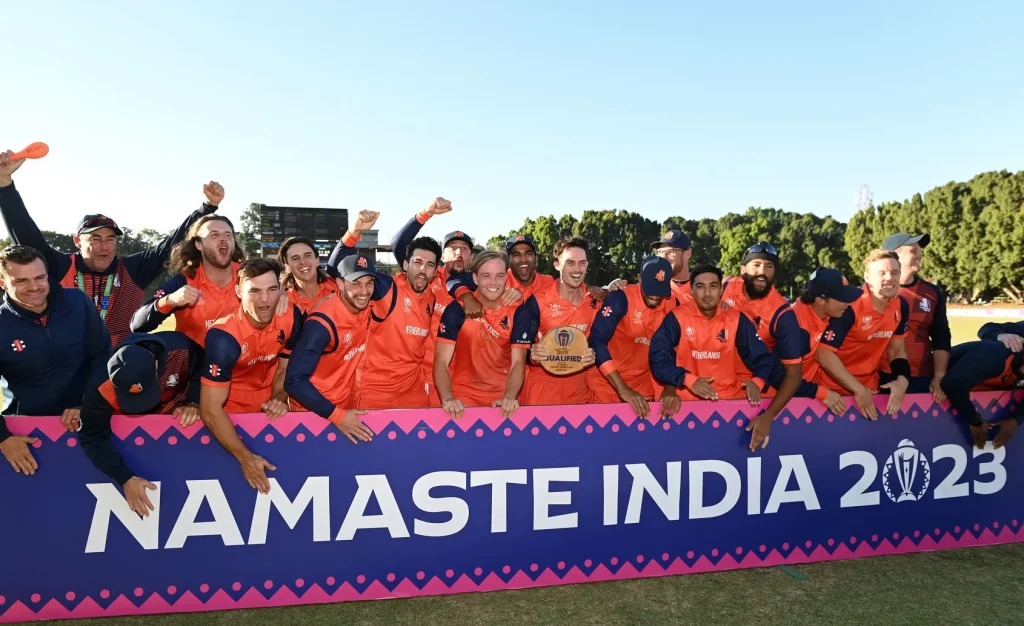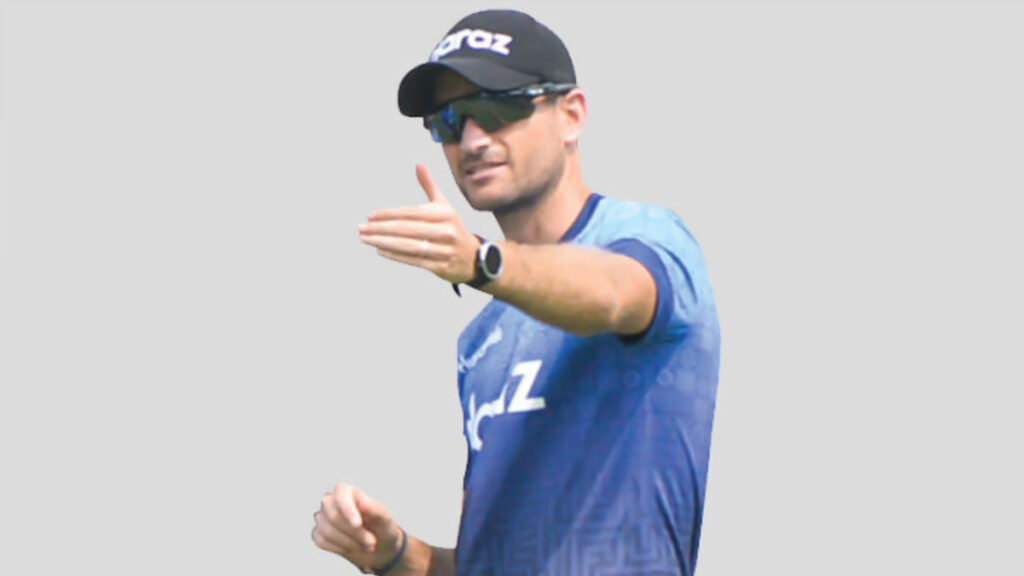
At 170 for 3, in pursuit of a monstrous 375 in the World Cup Qualifiers against the West Indies, Bas de Leede was dismissed by Akeal Hosein. At that juncture, very few believed that an inexperienced Netherlands side would overhaul the target.
But they did. Their fearless attitude in that game and right through the tournament was something that stood out, which in turn, proved to be the cornerstone of their World Cup qualification.
Ryan Cook, the Netherlands coach, shares an anecdote on how the backroom staff went about building team-spirit. “It was a team effort throughout the tournament, some special performances from individuals, really proud of the guys, they earned their position in the World Cup,” he told RevSportz.
“We took the guys out to the canal at Amsterdam, and taught them how to row. Our (present) CEO was previously a CEO of rowing, so we had some good contacts to touch base and help us. The whole idea was you need to put in your best effort, and obviously team work is needed to be able to take the boat forward.
“That is exactly what the guys did. The substitutes, who weren’t playing, were incredible in terms of their service, (and) that helped the players on the field. So, definitely, to see the cohesion of those players was something that warmed the hearts of the coaches and support staff and players.”
The West Indies-Netherlands game turned out to be a thrill-a-minute encounter, where the pendulum oscillated to and fro. Teja Nidamanuru and the ever-reliable Scott Edwards shared a hundred-plus stand. After a mini-collapse, where the Dutch lost both set batters, Logan van Beek took over with a breezy 14-ball 28. With just one needed off the last ball, Van Beek was dismissed by Alzarri Joseph. The all-rounder took that setback in his stride by cracking three sixes and three boundaries in the Super Over to leave Jason Holder and the West Indies in a state of stunned silence.
What does Cook think of that nerve-wracking game? Did he make observations before or during the match about how to go about chasing down massive totals? “Before the game, we had been speaking about previous experiences against the West Indies. We had played them in the Super League. There were learnings from those games. When they scored 374, it was going to be a high challenge for us. The previous game we played, we were about 170 for 2 after 28 overs against Nepal (Netherlands overhauled a target of 168 in 27.1 overs).
“I remember standing in the dressing room and saying to the guys, ‘if we had continued to bat there, probably 180 after 30, and if we doubled our score after 30, probably got about 360’. So when they got 374, I just reminded the guys about the fact this is how we are going to chase the runs. We were confident in our whole order. We sort of selected the team that had batting depth. And we knew when Teja joined Scott that they would be able to put up a good partnership at the required tempo. That 140-run partnership set us up. Logan and a couple of others chipped in to get a tie. And obviously Logan took it away in the Super Over. To do it chasing and in the context of a sort of must-win game was a brilliant achievement.”
Just over a week later, Netherlands were playing Scotland in a must-win game in the Super Sixes. They had to chase down the target in 44 overs to pip their opponent on the basis of NRR. Once again, on occasions, it seemed like the Dutch side was falling behind. However, their self-belief shone brightly as they charted a famous win and booked their place in the 50-over World Cup. Bas de Leede led the way with a heroic all-round performance — a five-wicket haul and a 92-ball 123.
“Obviously, we had to win but we had to also win in a specific amount of time. One of the moments of that game, at probably about 200 for 3, the guys got wickets and restricted Scotland to 270. That went a long way in helping us. There was obviously Bas getting five wickets. All the bowlers, too, chipped in with wickets over that time.
“Again, we went to the change room and discussed how we are going to chase those runs. Everyone was confident. But it took something special from Bas to accelerate the innings the way he did. The partnerships he managed with the other guys to keep up the run-rate were extraordinary. Everyone else was cheering from the sidelines. Again the context of the match being a really big one, it was great that he was able to do it under pressure.”
Despite the Netherlands’ awe-inspiring performance in the qualifiers, the road to the mega event has a few bumps on the way. After the completion of the tournament, Cook had made an appeal to major cricketing nations to play bilateral series against them. Also, for a sponsor or two to step up and support Netherlands cricket.

Due to a packed calendar, the chances of the Netherlands playing a few ODIs before the World Cup are ruled out. Cook, however, is still optimistic about their preparations. “At the end of the Sri Lanka game, in the final, I mentioned about having a few more fixtures against the main nations and obviously sponsorships and things like that will help us produce a bit more resources. But all teams are taken up in terms of what they have got. I don’t think there is time for major nations to play us before the World Cup. Nonetheless, we have put in a good program.
“We will tour India for a developmental camp. So we are bringing about 14-15 players to India to get used to those conditions. And just get a feel of what it is like, because many of them haven’t been to the subcontinent. Then we will have another camp before the World Cup in Bengaluru, which will have everybody together. We will be able to build our strategies going up to the tournament. We have got a couple of games there and a few here. We are playing the Pro Series, which is pretty much the 22 best players in the country playing for two teams. Hopefully, these preparations can do us good.”
Even on a long-term basis, there are concerns whether the associate nations would get to play ODIs after the World Cup, especially in the backdrop of the World Cup Super League being scrapped. The move comes on the back of the ICC adding four more teams to the entry list for the 2027 World Cup. Perhaps, in some ways, it is also a sign that 50-over bilaterals aren’t high on priority for various national boards.
Incidentally, the Super League did play a crucial role in helping Netherlands scale up their standards as they got the opportunity to take on full-member sides. The results didn’t exactly go their way, but on occasions, they threatened to upset the apple-cart. “The Super League was good for us, in terms of being able to play the best teams. We put ourselves in good positions. We didn’t have the experience to make those positions count. Having had those games, both home and away, allowed the guys to play at different positions and get a lot of experience.”
Although cricket was introduced to the Netherlands by British soldiers in the 19th century and the Dutch Cricket Union was formed in 1890, it has remained a niche sport. However, a small but dedicated group of board members are trying to branch out the game. “The cricket board of the Netherlands is one of the oldest. It’s a small community but a very passionate one. I think a lot of emphasis is getting placed into the national sides — men and women. A lot of effort is put into the Under-19 team.
“But as I mentioned, there is not a lot of recourse, in terms of developing full-blown programmes like some of the major cricketing nations would have. So it is about how we put our resources into developing players in that base. The pathways are the Under-19, A team and the national team. I think this year we managed to secure 14 or 15 fixtures for the A side. So there is a lot more development happening around. Hopefully, that will broaden the base of players and attract the players, who probably otherwise do other sports, and come and play cricket rather than football or hockey as well.”
Despite facing hurdles, alongside having limitations, the Netherlands set-up would be brimming with confidence going into the World Cup, even though they have a happy headache to confront — the dilemma of choosing between main players who would likely return to the national side for the World Cup and those who took them to the event with their inspirational performance in the qualifiers.
Simply put, Colin Ackermann, Fred Klaassen, Paul van Meekeran, Roelof van der Merwe, Brandon Glover, Timm van der Gugten and others weren’t part of the qualifiers, as they had county commitments. “In the Netherlands, we are trying to set up a more professional structure by broadening the base so that more players can attend the training. That has gone a long way in upscaling and developing the players to do what they did (at World Cup Qualifiers).
“We see them as additions to the side (players who have contracts with English counties). But when they are not playing for us, we do feel like the guys who are training day in and day out, they are training for that level. We are grateful when those players come back to play for the Netherlands. And when they do play, they play with a great amount of passion and skill. That helps us in terms of everybody playing for us,” he points out.
Above all, the Netherlands seem to have a captain with a mature head on his shoulders. Edwards, the wicketkeeper-batter also leads from the front with the bat in hand. Fifties against Afghanistan and Pakistan last year, along with crucial contributions versus the West Indies and Sri Lanka in the qualifiers validate this point.
As Cook says, “I have known Scott for a year and a bit now. He is a fantastic human being. He works very hard and is one of the unsung heroes in the team. He puts in his best when we are under pressure. He puts in a lot of work behind the scenes, prepares thoroughly for each game and each opposition.”
It was the simple virtues of life — hard work, team spirit and unwavering belief — that laid the foundation for the Netherlands’ impressive show in the qualifiers. And you expect the same from the players who will shortly be arriving for the World Cup. Here they come saying ‘Namaste India’



